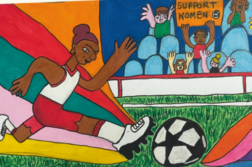Disclaimer: The views expressed in this article are those of the author and are not attributable to Wessex Scene as a whole.
Joe Hart, once England’s first choice goalkeeper and now playing as a third-choice goalkeeper for Tottenham Hotspur, had to apologise after waking up to find out his social media team had accidentally sent out an Instagram story.
His official Instagram account, which boasts over 1.3m followers, shared a graphic which showed that his side has just lost 3-0 (3-2 aggregate) to Dinamo Zagreb, ending their hunt for European glory in the UEFA Europa League.
Captioned alongside this graphic, Hart’s post read simply: ‘Job done’, with a tick beside it.
Naturally, Spurs fans were furious. It appeared that Joe Hart was being ironic, sarcastic, or taking the mick a bit – really rubbing in the fact that his side were out of the competition in a way which may have come across as quite insulting, especially as this was moments after the game had concluded.
Hart played no part in the game.
The next morning, a visibly tired Hart shared an embarrassing Instagram story, pinning the blame on his social media team and admitting that he was unaware of the post until the morning. It was removed, and the apology was there.
But should footballers be accountable for their actions on social media? Surely the answer here is yes.
Rather than outsourcing their social media to a company – who are probably running several athletes’ accounts if not other celebrities too – it should be the case that sports stars run their accounts and are consequently accountable for their actions on social media, too.
Phil Foden has become the recent victim of poor social media management – or, at least, poor judgement. He was frustrated after his social media team, run by Ten Toes Media, posted a tweet involving PSG forward Kylian Mbappe, against whom Foden’s side will play in the UEFA Champions League Semi Final.
The tweet read: ‘@KMbappe are you ready?‘ along with an emoji of two hands shaking and an image of the 20-year-old.
Whilst it could have been perceived as a bit of a tongue-in-cheek comment with no malice intended, Foden was not best pleased – he has since parted company with Ten Toes Media, who dispute the claim that the tweet was not approved.
In a statement, Ten Toes Media said,
‘We are saddened with the current situation. Since the company was founded we have adopted a process which requires all posts to be approved in advance by the talent or representative – no exceptions. They have always been approved – that has been true for 4 years, and is still true today‘.
What this has brought to light is that sports stars are unable to take responsibility for what they post under their name. Surely, in shifting the blame onto the company – who may well have put this tweet out, or in Hart’s case, posted that story – the players are saying ‘what goes out in my name isn’t actually what I say’?
There are two options here: either, players start to take responsibility for what they post on social media and not hire in external companies upon whom they can shift accountability when mistakes happen, or they come off social media altogether.
I mentioned on here a few weeks ago about players having their accounts run by social media companies. Lads run your own accounts! Your independent thought and authenticity is at stake . It’s your voice , not anyone else’s. Morning by the way . Go and attack the hell out of it ❤️ pic.twitter.com/M997r8kbWa
— Gary Neville (@GNev2) April 15, 2021
Gary Neville’s tweet after the Foden incident summed it up well – players should take responsibility for what they tweet or post online for the sake of their authenticity or independent thought. Not only will this allow fans to gain a real understanding as to the personality of the athlete, but it will also mean that sports starts gain credibility for what they post.
I, for one, am not a fan of footballers posting the same thing after every game. “In to the next round!“, “+3 points!“, “Tough one to take, we go again“. These stock phrases do nothing to help fans really gain any sort of admiration for a sports star.
I much prefer players who are willing to take responsibility for their posts – one only has to look at Allan Saint-Maximin as an example of this. The Newcastle winger is definitely not paying a company to tweet the sorts of things he puts out like the tweet in response to an Everton fan recently.
Thank you for your comment Patrick 🤝 https://t.co/2fdqkWFCsd pic.twitter.com/Ip5sLhKRnb
— Allan Saint-Maximin (@asaintmaximin) April 11, 2021
Not only does this earn him a bit more of a reputation, but he isn’t embarrassed to post things that show who he really is.
If sports stars want to have a good relationship with fans and the media, perhaps being themselves online is a good place to start.



